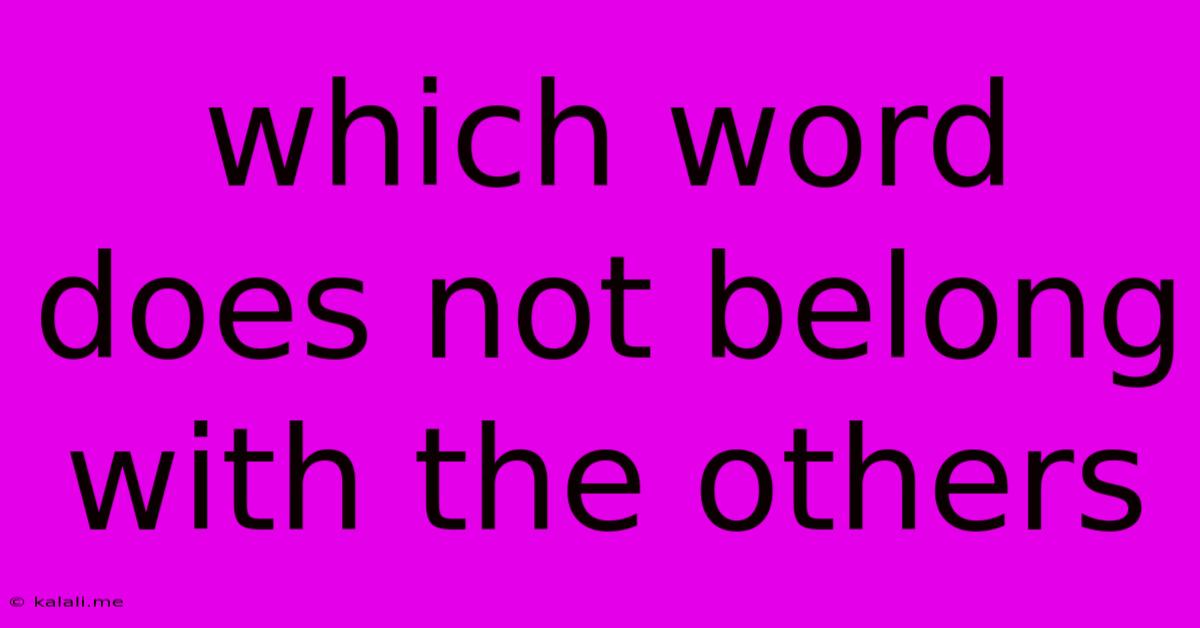Which Word Does Not Belong With The Others
Kalali
Jun 11, 2025 · 3 min read

Table of Contents
Which Word Doesn't Belong? A Fun Exercise in Critical Thinking and Vocabulary Building
This seemingly simple question – "Which word doesn't belong?" – is actually a powerful tool for boosting critical thinking skills and expanding your vocabulary. It forces you to analyze relationships between words, identify patterns, and ultimately, justify your answer. This article will explore different approaches to solving this type of word puzzle and provide examples to illustrate the various techniques involved. It’s a great exercise for students, word game enthusiasts, and anyone looking to sharpen their cognitive abilities.
Understanding the Different Types of Relationships
The key to solving "which word doesn't belong" puzzles lies in recognizing the relationships between the words. These relationships can take many forms:
1. Categorical Differences:
This is the most straightforward type. One word belongs to a different category than the others.
- Example: Orange, Banana, Apple, Carrot. The answer is Carrot, as it's a vegetable, while the others are fruits.
2. Part-to-Whole Relationships:
One word is a part of the whole represented by the others.
- Example: Wheel, Engine, Car, Tire. The answer is Car, because the other words are components of a car.
3. Analogical Relationships:
The words share a relationship of analogy or similarity, but one word disrupts the pattern.
- Example: Hot, Cold, Warm, Fast. The answer is Fast, as the other words describe temperature, while "fast" describes speed.
4. Semantic Relationships:
The words are linked through meaning, but one word has a different connotation or association.
- Example: Joy, Happiness, Ecstasy, Anger. The answer is Anger, as it is a negative emotion, unlike the others which are positive.
5. Grammatical Differences:
Sometimes the odd word out is identified by its grammatical function.
- Example: Run, Jump, Swim, Running. The answer is "Running," as it's a gerund (verb acting as a noun), while the others are verbs in their base form.
Strategies for Solving "Which Word Doesn't Belong?" Puzzles
To effectively tackle these puzzles, consider these strategies:
- Identify the common thread: Look for shared characteristics, categories, or relationships among the words.
- Consider different perspectives: Don't limit yourself to one type of relationship. The answer might be based on a less obvious connection.
- Eliminate possibilities: Systematically rule out words that fit a particular pattern.
- Justify your answer: Always explain why you chose a particular word as the odd one out. This strengthens your critical thinking skills.
Advanced Examples and Challenges
Let's try some more challenging examples:
- Example 1: Oak, Maple, Pine, Chair. (Think about the category of each word.)
- Example 2: Sunrise, Sunset, Moonrise, Noon. (Consider the time of day and celestial bodies.)
- Example 3: Symphony, Sonata, Poem, Concerto. (Focus on the art form.)
By regularly practicing these puzzles, you’ll improve your ability to identify patterns, analyze relationships, and expand your vocabulary – all essential skills for success in various aspects of life. So, grab a pen and paper, and start challenging yourself! The more you practice, the better you’ll become at identifying the word that doesn’t belong.
Latest Posts
Latest Posts
-
What Is The Conjugate Base Of H2po4
Jun 12, 2025
-
100 Words To Describe Your Mom
Jun 12, 2025
-
What Number Is Lviii In Roman Numerals
Jun 12, 2025
-
How To Change Octal To Hexadecimal
Jun 12, 2025
-
Reaction Of Calcium Chloride And Water
Jun 12, 2025
Related Post
Thank you for visiting our website which covers about Which Word Does Not Belong With The Others . We hope the information provided has been useful to you. Feel free to contact us if you have any questions or need further assistance. See you next time and don't miss to bookmark.